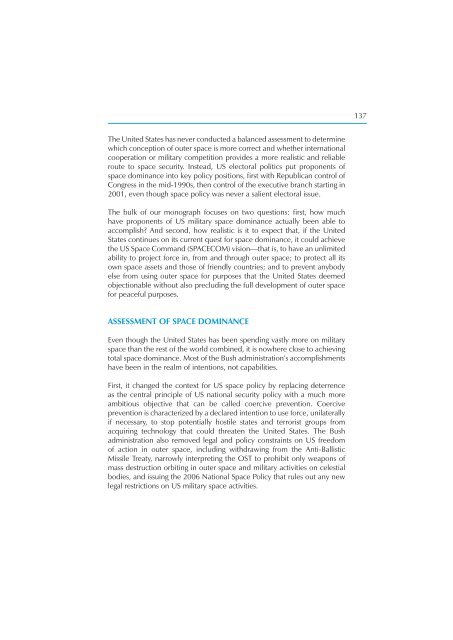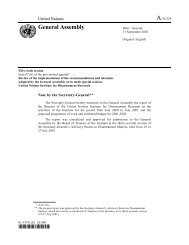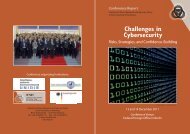Security in Space The Next Generation - UNIDIR
Security in Space The Next Generation - UNIDIR
Security in Space The Next Generation - UNIDIR
Create successful ePaper yourself
Turn your PDF publications into a flip-book with our unique Google optimized e-Paper software.
<strong>The</strong> United States has never conducted a balanced assessment to determ<strong>in</strong>e<br />
which conception of outer space is more correct and whether <strong>in</strong>ternational<br />
cooperation or military competition provides a more realistic and reliable<br />
route to space security. Instead, US electoral politics put proponents of<br />
space dom<strong>in</strong>ance <strong>in</strong>to key policy positions, fi rst with Republican control of<br />
Congress <strong>in</strong> the mid-1990s, then control of the executive branch start<strong>in</strong>g <strong>in</strong><br />
2001, even though space policy was never a salient electoral issue.<br />
<strong>The</strong> bulk of our monograph focuses on two questions: fi rst, how much<br />
have proponents of US military space dom<strong>in</strong>ance actually been able to<br />
accomplish? And second, how realistic is it to expect that, if the United<br />
States cont<strong>in</strong>ues on its current quest for space dom<strong>in</strong>ance, it could achieve<br />
the US <strong>Space</strong> Command (SPACECOM) vision—that is, to have an unlimited<br />
ability to project force <strong>in</strong>, from and through outer space; to protect all its<br />
own space assets and those of friendly countries; and to prevent anybody<br />
else from us<strong>in</strong>g outer space for purposes that the United States deemed<br />
objectionable without also preclud<strong>in</strong>g the full development of outer space<br />
for peaceful purposes.<br />
ASSESSMENT OF SPACE DOMINANCE<br />
Even though the United States has been spend<strong>in</strong>g vastly more on military<br />
space than the rest of the world comb<strong>in</strong>ed, it is nowhere close to achiev<strong>in</strong>g<br />
total space dom<strong>in</strong>ance. Most of the Bush adm<strong>in</strong>istration’s accomplishments<br />
have been <strong>in</strong> the realm of <strong>in</strong>tentions, not capabilities.<br />
First, it changed the context for US space policy by replac<strong>in</strong>g deterrence<br />
as the central pr<strong>in</strong>ciple of US national security policy with a much more<br />
ambitious objective that can be called coercive prevention. Coercive<br />
prevention is characterized by a declared <strong>in</strong>tention to use force, unilaterally<br />
if necessary, to stop potentially hostile states and terrorist groups from<br />
acquir<strong>in</strong>g technology that could threaten the United States. <strong>The</strong> Bush<br />
adm<strong>in</strong>istration also removed legal and policy constra<strong>in</strong>ts on US freedom<br />
of action <strong>in</strong> outer space, <strong>in</strong>clud<strong>in</strong>g withdraw<strong>in</strong>g from the Anti-Ballistic<br />
Missile Treaty, narrowly <strong>in</strong>terpret<strong>in</strong>g the OST to prohibit only weapons of<br />
mass destruction orbit<strong>in</strong>g <strong>in</strong> outer space and military activities on celestial<br />
bodies, and issu<strong>in</strong>g the 2006 National <strong>Space</strong> Policy that rules out any new<br />
legal restrictions on US military space activities.<br />
137








